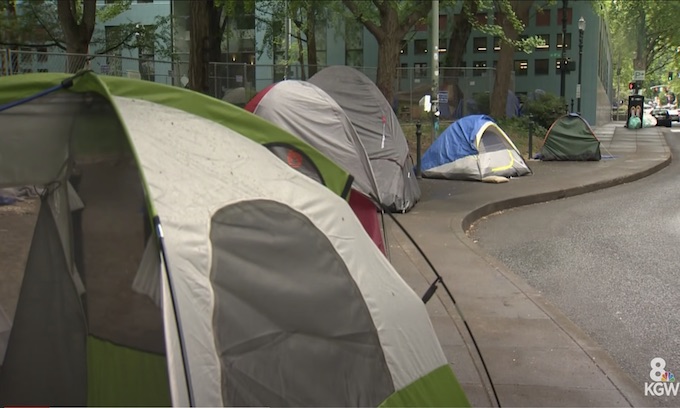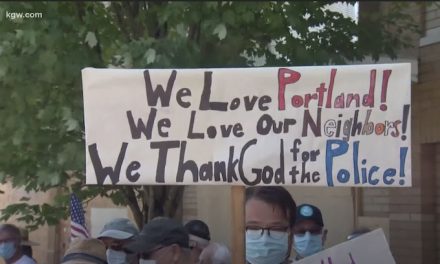Ten Portland residents with physical disabilities filed a lawsuit late Tuesday afternoon against the city of Portland alleging the city failed to comply with the Americans with Disabilities Act by allowing tent encampments to block sidewalks.
The residents are asking that the city be required to remove tents and related items from all city sidewalks and to construct, purchase or make available an adequate amount of shelter for individuals experiencing homelessness forced to move from their makeshift homes.
The residents who filed the lawsuit have mobility disabilities that require them to use an electric scooter, wheelchair or walker, are legally blind with a need to use a cane, or are caretakers for someone who has a mobility disability.
They asked the judge to certify their suit as a class action on behalf of all such residents. Within the city of Portland, nearly 13% of residents live with a disability, the lawsuit states.
“(The city) has taken only limited action to maintain its sidewalks clear from tent encampments and debris,” the lawsuit says. “While political pressure has mounted on city officials to address these issues, competing political headwinds and countervailing forces have prevented the city from acting.”
Officials in the mayor’s office did not immediately respond to a request for comment Wednesday morning.
The lawsuit includes a collection of photographs that show sidewalks completely blocked by tents and personal items, particularly in Old Town, the Pearl District, the Lloyd District and the Central Eastside Industrial District.
While many of the encampments pictured have since been removed, many others have popped up since and the city has taken few steps to ensure that encampments don’t persist or return, such as offering enough shelter or housing, the lawsuit states.
One example cited in the lawsuit was a cluster of tents that lined sidewalks on both side of Northwest 19th Avenue between Thurman and Savier streets, where the avenue runs under Interstate 405. “This encampment is particularly problematic because it could prevent persons with mobility disabilities from crossing under I-405 without maneuvering unsafely in the streets,” the lawsuit states. Having to maneuver into various streets to get around tents and other makeshift homes has forced disabled residents to face “dangerous threats to their physical well-being” and risk “being struck by cars,” it says.
Sidewalk blockages have prevented residents with disabilities from accessing public transportation, restaurants, stores and other destinations, the lawsuit says.
Currently, the city bans people from camping along 21% of city roads or sidewalks, but the ban is not universally enforced. Under an emergency order the Mayor Ted Wheeler issued earlier this year, unhoused individuals are not allowed to live near dangerous roadways or near the city sanctioned tiny home villages. And at the end of August, Wheeler expanded the emergency order to also ban camping along sidewalks designated by the city’s transportation bureau as commonly used walking routes to more than 110 public and private schools citywide.
The mayor’s office has also continued to prioritize frequent, aggressive sweeps in Old Town, downtown, near Laurelhurst Park and Sunnyside School Park, among other areas.
With the onset of the pandemic in spring 2020, the city dramatically lowered the number of encampments it swept due to federal pandemic guidelines. But it moved quickly to scale back up removals this year. In early April, the city nearly doubled the number of sweeps conducted each week. And by mid-June, sweeps increased sixfold as compared to the start of the year.
However, the city faces a need to offer humane solutions to those who face evictions from their encampments amid a lack of shelter beds and housing options. And that need is great — Multnomah County is home to an estimated 5,228 unhoused people, with most of those individuals centered in Portland. Of those individuals, 58% are estimated to be living on the streets while the remainder are in temporary shelter.
Since April 11, the city has offered shelter referrals to 808 people before or during an encampment sweep. Of those, 330 people have used a shelter bed for at least one night. Many unhoused individuals say they don’t feel safe staying in mass shelter or have been turned away due to capacity limits.
Without enough resources to transition unhoused people from the streets to housing, encampments will continue being built. While the city continues to shuffle encampments from one city block to another, homeless advocates have repeatedly said that creates causes trauma and can delay people from making progress on obtaining housing.
Nicole Hayden reports on homelessness for The Oregonian/OregonLive. She can be reached at [email protected] or on Twitter @Nicole_A_Hayden.
©2022 Advance Local Media LLC. Visit oregonlive.com. Distributed by Tribune Content Agency, LLC.
—-
This content is published through a licensing agreement with Acquire Media using its NewsEdge technology.



















How many of these litigants voted a straight democrap ticket? If they did, throw the lawsuit out.
You asked it before i could.. I agree. IF THESE NITWITS voted these commucrats into office, they only have THEMSELVES to blame….